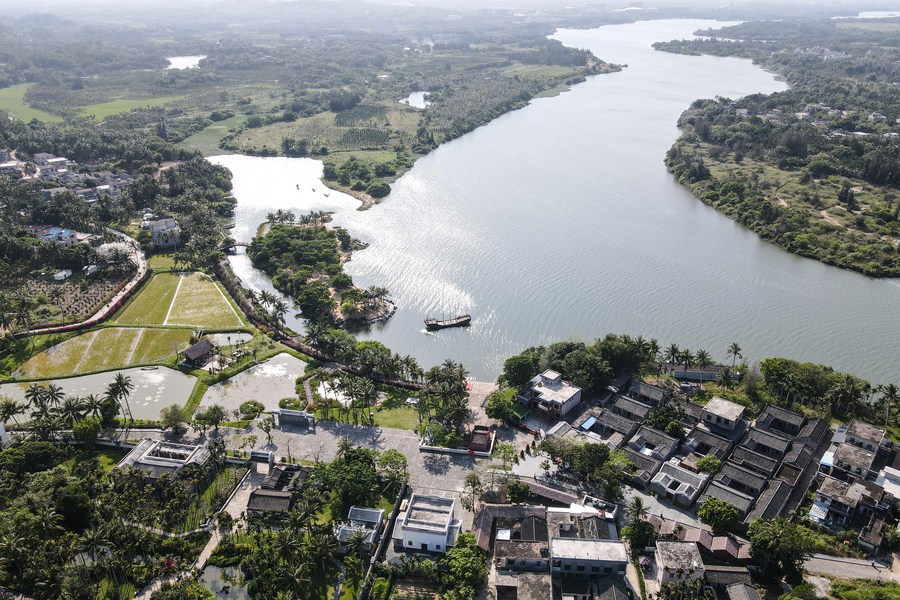Xi's Economic Agenda: Firmly pushing opening-up in unstable, uncertain world

Aerial photo taken on April 8, 2022, shows the view of Liuke Village in Boao, south China's Hainan Province. [Xinhua/Zhang Liyun]
BEIJING -- China's resolution to forge ahead with opening-up was reaffirmed in the latest public speech of Chinese President Xi Jinping.
"No matter how the world will change, China's faith in and its commitment to reform and opening-up will not waver," Xi said when addressing the Boao Forum for Asia (BFA) Annual Conference 2022 on Thursday.
A flurry of policies are to ensue, as Boao has been a place to see China walk its talk on expanding high-standard opening-up.
Since 2013, President Xi has participated in the BFA annual conferences and delivered keynote speeches five times. Among other key issues, his remarks on opening-up have become all the more relevant as the globe is plagued by protectionism, deglobalization, and the COVID-19 pandemic.
This year, the country's renewed opening-up efforts range from fully implementing the negative list for foreign investment, expanding the encouraged investment catalog, improving services for investment promotion, to adding more cities to the pilot program of opening the service sector.
A hallmark of China's economy, opening-up has become an indispensable part of the new development philosophy put forward by Xi. Over the past decade, the country has adopted a more active stance to integrate into the globe and opened its door wider.
The country set up its first free trade zone in its financial hub Shanghai in 2013 and has established 20 more nationwide. Negative list for foreign investment has been shortened for five consecutive years.
High-quality cooperation under the Belt and Road Initiative (BRI) has been promoted for mutual benefits. The Regional Comprehensive Economic Partnership (RCEP) agreement, the world's largest free trade deal with China as one of signing members, came into force on the first day of 2022.
As is well-known, openness brings fiercer competition and higher requirements for governance. However, the wider the Chinese economy opens, the more confident the country becomes when interacting with the rest of the world.
In his keynote speech made in 2013, Xi envisaged a world of common development. This year, he likened countries around the world to "passengers aboard the same ship who share the same destiny," calling on "all passengers" to pull together for the ship to navigate the storm and sail toward a bright future.
"Choosing dialogue and cooperation over zero-sum games, openness and inclusiveness over a closed-door and exclusive approach, and exchanges and mutual learning over a sense of superiority: this is the only choice worthy of the broad-mindedness of Asians," Xi said.
From putting forward the BRI to striving to build Hainan into a free trade port, Xi has been pushing the world's second-largest economy to embrace the globalization.
China's adherence to opening-up has not only resulted in its own growth miracles but contributed greatly to the global development at large.
"The fundamentals of the Chinese economy -- its strong resilience, enormous potential, vast room for maneuver and long-term sustainability -- remain unchanged," Xi said in his speech on Thursday. "They will provide great dynamism for the stability and recovery of the world economy and broader market opportunities for all countries."
China will press ahead with high-quality Belt and Road cooperation to make it high-standard, sustainable and people-centered, he said.
From Malaysia's durian plantation to the Thai-Chinese Rayong industrial zone, from Croatia's wind power project to China-Europe freight trains, the BRI has delivered tangible benefits to people in participating countries.
In a world still reeling from COVID-19, rallying support for openness and building a community with a shared future is more pressing and prominent than ever.
Over the past two years, China's economic governance has served as the anchor of stability for the world -- its stable production guaranteeing a lifeline for industrial and supply chains and facilitating global recovery. Championing multilateralism in battling the pandemic, China actively offered vaccines to countries in need, which helped narrow the "immunization gap."
Looking ahead, an increasingly open China will play an even greater role in promoting peace and development.
China will implement the RCEP in full, seek the conclusion of high-standard free trade agreements with more countries and regions, and actively work for joining the Comprehensive and Progressive Agreement for Trans-Pacific Partnership and the Digital Economy Partnership Agreement, Xi said on Thursday.
"China will unswervingly follow the path of peaceful development, and always be a builder of world peace, a contributor to global development, and a defender of the international order," Xi said.
























